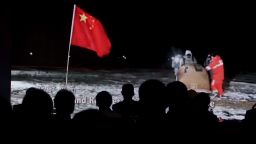Three Chinese astronauts are extending their stay in orbit following concerns that their spacecraft may have sustained damage from space debris. The crew, consisting of Chen Dong, Chen Zhongrui, and Wang Jie, was scheduled to return to Earth on March 15, 2024, after a six-month mission aboard the Shenzhou-20. The announcement was made by the China National Space Administration (CNSA) on the same day they were meant to land.
The astronauts had already completed their handover of operations at the Tiangong space station to a new crew prior to the postponement. The CNSA did not provide specific details regarding the extent of the damage or the duration of the assessment process, stating only that “impact analysis and risk assessment are under way.”
Despite the setback, the CNSA emphasized that the postponement was primarily for the safety and health of the astronauts. No alternative return dates have been announced, leaving the crew in a state of uncertainty as they await further evaluation of their spacecraft.
This delay follows a significant milestone for China’s space program, which has seen an accelerated pace in recent years. Just days earlier, the country celebrated the successful launch of Shenzhou-21, which transported a new group of astronauts to the Tiangong space station. Among this cohort is Wu Fei, reported by local media as the youngest astronaut from China to reach space at the age of 32.
In a ceremony broadcast by state-owned CCTV, Chen Dong formally passed the hatch key symbolizing operational control of the station to the incoming crew. “We are about to return to Earth, and now I am handing over the hatch key that symbolizes the right to maintain operations on this Chinese space station to you,” he stated, highlighting the expected transition of responsibilities.
The CNSA’s ongoing advancements in space exploration have garnered attention globally, especially as they prepare to open the doors of the Tiangong space station to international astronauts, with plans to welcome a representative from Pakistan next year.
These developments have prompted concerns within the United States, particularly as NASA works to resume its own lunar missions. The U.S. space agency has faced its own challenges in recent months; astronauts Suni Williams and Butch Wilmore experienced an extended mission when their scheduled return was delayed for over nine months due to a malfunction with the Boeing Starliner spacecraft. They eventually returned in a SpaceX Crew Dragon capsule.
As the CNSA continues its risk assessments, the focus remains on ensuring the safe return of its astronauts while navigating the complexities of modern space exploration.







